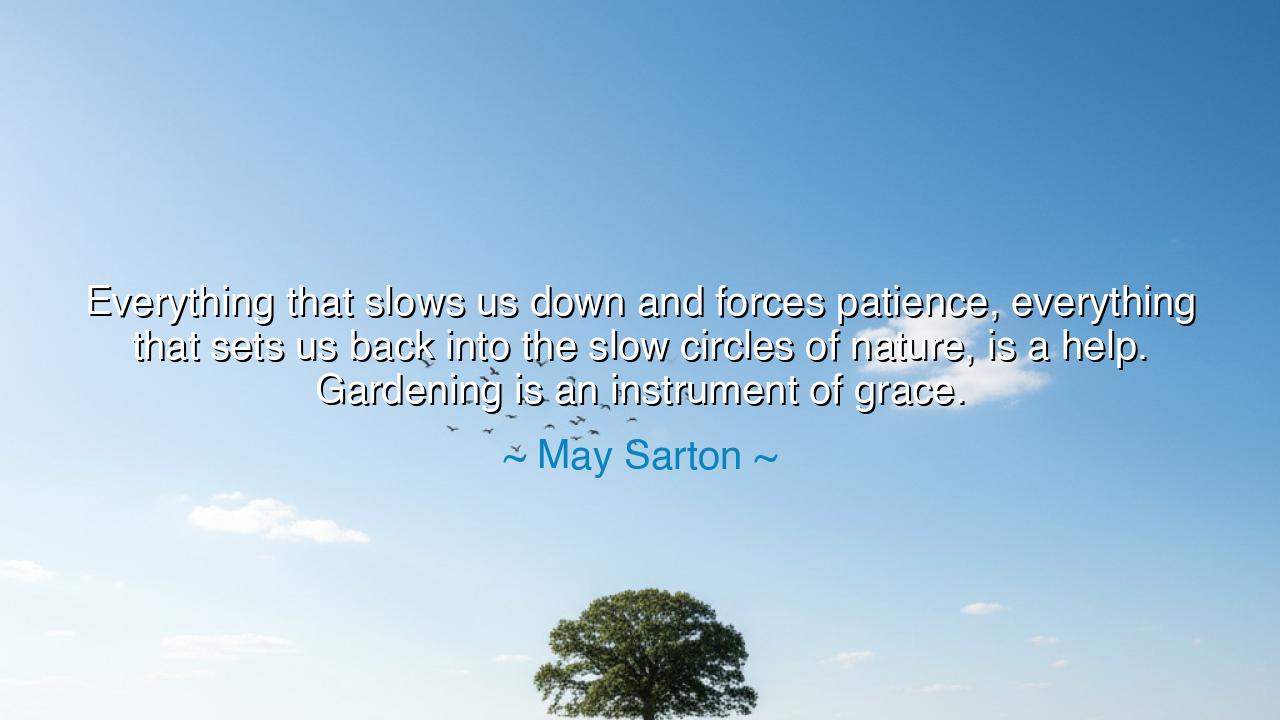
Everything that slows us down and forces patience, everything
Everything that slows us down and forces patience, everything that sets us back into the slow circles of nature, is a help. Gardening is an instrument of grace.






In the fast-paced world we inhabit, where the demands of modern life often overwhelm us, there lies a profound wisdom in the slowing down of our lives. May Sarton, in her reflection, "Everything that slows us down and forces patience, everything that sets us back into the slow circles of nature, is a help. Gardening is an instrument of grace," speaks to the healing power of stillness. In these words, she draws attention to the forces of nature that, while seeming to delay or impede us, actually serve to bring us into a deeper, more harmonious relationship with the world. Gardening, in its deliberate pace, becomes a tool not only for growing plants but for cultivating inner peace, a grace that emerges from the rhythms of the earth itself.
The ancients understood well the necessity of patience and the power of nature to restore the soul. The Greek philosophers, particularly Aristotle, taught that true virtue was achieved through the deliberate practice of moderation and patience. Aristotle’s idea of the Golden Mean urged people to seek balance, to temper the passions with thoughtfulness, and to engage with life in a way that aligns with the natural rhythms of the world. Gardening, as Sarton suggests, is an act of patience—an act of surrendering to the slow passage of time, recognizing that growth does not come instantly, and that true nourishment comes not through haste, but through careful and consistent care. The gardener, like the philosopher, knows that wisdom emerges in the quiet moments of waiting.
In ancient China, the Taoists believed in the power of stillness and patience. The Tao Te Ching, written by Laozi, teaches that life’s flow cannot be forced, that to live harmoniously with the world, one must cultivate the virtue of patience and allow things to unfold naturally. Laozi famously wrote, “The Tao does not hurry, yet everything is accomplished.” In this light, gardening becomes a Taoist practice: a way of aligning oneself with the slow rhythms of nature, learning to cultivate patience, and letting the earth unfold its cycles in its own time. The gardener is, in a way, a practitioner of Tao, patiently awaiting the growth of the seed, understanding that all things have their time and place in the natural world. Gardening, then, is not just a task, but a spiritual practice, one that teaches the value of waiting, of listening to the world, and of embracing the present moment.
The act of gardening, when done with intention, also mirrors the Zen practices of ancient Japan, where the garden was not simply an aesthetic creation, but a means of cultivating mindfulness and inner peace. Zen monks often tended to their gardens as a form of meditation. The meticulous act of raking sand in a Zen garden, or pruning plants with great care, was a way of entering into a state of deep presence, where the gardener could quiet their mind and attune themselves to the rhythms of the universe. In these gardens, every action, no matter how small, was done with great attention—the process itself became a spiritual path, a way to center the mind and body in the present moment. Gardening, as Sarton suggests, is indeed an instrument of grace, a means by which we slow down, reflect, and reconnect with our deeper selves.
The lesson in May Sarton’s words is one of embracing the natural rhythms of life. In a world that constantly pulls us towards speed and efficiency, gardening offers us a chance to step back, to witness the process of growth and change, and to find peace in the slowness. Thomas Jefferson, the third president of the United States, and a dedicated gardener himself, once wrote, “The greatest service which can be rendered to any country is to add a useful plant to its culture.” But Jefferson also knew that gardening was not just a practical activity—it was a way to reconnect with the land and with oneself. He found solace in his gardens, and in the quiet act of planting and tending, he experienced the very grace Sarton speaks of: the grace that comes from slowing down, from giving time to something greater than the demands of the world.
This lesson is particularly important for us today, in an age where we are continually rushing, constantly moving from one task to the next. Sarton’s reflection invites us to pause, to take time to plant a seed, to wait for it to grow, to tend to it with care. In that process, we learn the value of patience, and in the quiet circles of nature, we rediscover a part of ourselves that is often lost in the noise of modern life. Gardening is a way to nourish our souls, to find a pace that is in harmony with the natural world, and to embrace the stillness that is so often missing from our lives.
Let us then follow Sarton’s advice and slow down. Let us find grace in the act of planting, in the simple and quiet moments spent in the garden. Whether tending to a small patch of earth or a vast landscape, we must understand that gardening is not just about growing plants; it is about growing ourselves. Each seed we plant, each moment we spend in the slow circles of nature, is an opportunity to reconnect with patience, presence, and grace. As we cultivate the earth, so too do we cultivate our spirits, learning that true growth comes not from speed, but from the quiet, steady rhythm of time and care. May we embrace this rhythm, and in doing so, find the peace and grace that gardening offers.






AAdministratorAdministrator
Welcome, honored guests. Please leave a comment, we will respond soon